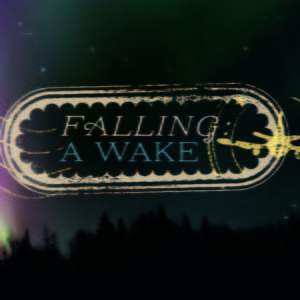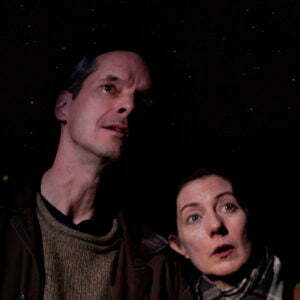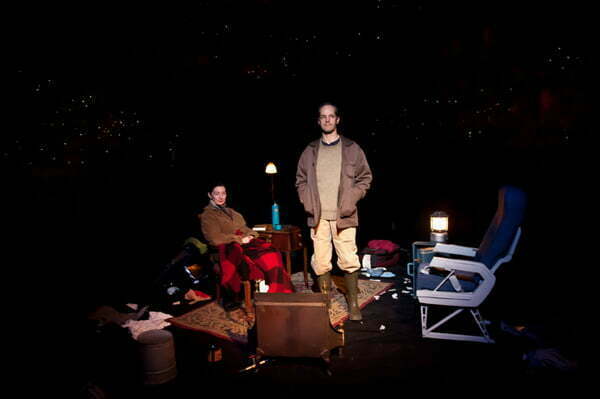Falling: A Wake
Directed by Victoria Delorio
At Rivendell Theatre, 5775 N. Ridge Ave.
A surreal exploration of grief at an inadvertent wake.
Few moments in deus ex machina compare with the sudden apparition of a body thrown from the heavens to land unruffled in an unassuming backyard. As machinations go, it’s an intriguingly macabre set-up for a couple to attempt to augur the will of God (or lack thereof) and probe the mysteries of grief. Falling: A Wake, like its title, doesn’t commit to a single meaning. It’s a somewhat ghastly, often poignant and wryly funny episode in a single starlit night of a diametrically opposed yet affectionate couple.
It starts with a big bang. Elsie (Jane Baxter Miller) and her husband Harold (Mark Ulrich), married some 25 years, live in the “nondescript edge of nowhere” outside Ontario. On a random autumn night, they observe what at first appears to be a shooting star. A romantic interlude quickly turns tragic as the “star” loudly combusts, raining debris from what is revealed to be an exploded jetliner. Horrifically, it deposits the aforementioned body of a comely young man (Will Crouse) on their property. Like a tornado that inexplicably leaves a home untouched amidst the ruins, he appears oddly unscathed—he could be merely sleeping in his headphones and blazer.
With the power and phones knocked out, Elsie and Harold can do nothing but speculate as to the nature of the disaster. They appear oddly nonplussed by the memento mori from the sky, and anyone familiar with the stages of grief will recognize this as the first phase, “denial” (also known as “shock and denial”—and it’s clear this couple is in shock). Elsie is moved by the boy, and decides to keep vigil over his body. Unable to accept he’s truly gone, she chooses instead to speak to his spirit to keep it company in case a vestige remains (not unlike a true ‘wake’). Harold is more pragmatic, a former science teacher that questions the very existence of existence. The conversations between Harold, Elsie and the stranger explore a secret grief they’ve left untended too long and hit upon some universal themes of the pains of letting go. The remaining stages of grief follow in pithy succession. Muted anger in the questioning of the universe’s unfairness; bargaining to keep their denial in place; depression in the realization of how much has been lost; and at long last, they embrace a certain acceptance.
Kirkham’s characterizations are at times overly quirky but remain grounded thanks in large part to the heartfelt performances of Miller and Ulrich. They bring Kirkham’s stylization down to earth with their sincerity—Miller as the sly and dutiful wife, Ulrich as a stalwart but doting husband. It definitely takes a lot to get over the presence of a corpse on the stage and the very concept that this couple could be so collected in the face of such bizarre circumstances. If you take it as a wake, however, it becomes easier. The revelations of Elsie and Harold’s painful past combine with their present to create an escape to the causality loop of their grief. Like all machina, it’s a little convenient to the detriment of the amount of naturalism that can be established by three actors conversing wherein one is a mute device. The balance of stylistic and natural elements takes some serious acclimation.
The rewards eventually outweigh the costs as Falling is genuinely moving and bittersweetly humorous despite its contrivances. Inspired by Kirkham’s coping with the loss of a friend in the bombing of Pan Am flight 103 over Lockerbie Scotland in 1988, it’s his attempt at theatrical catharsis. It doesn’t take a side on the debate of a caring versus indifferent universe that could twice afflict an innocent couple. Instead, it seems to acknowledge an endless debate where the answer lies in embracing the contradictions at the core of the two truths. Only then can a certain amount of peace be found for those left behind by those for whom the answers are no longer important.
Recommend.
Reviewed by Clint May
Date Reviewed: March 17, 2012
At Rivendell Theatre, 5775 N. Ridge Ave, Chicago, IL



